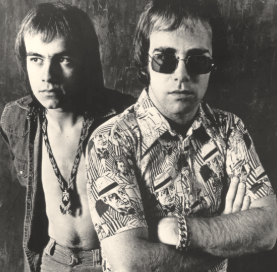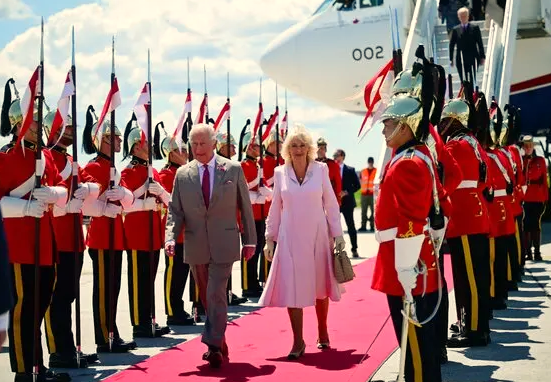ABOUT WHO SAVED ELTON JOHN’S LIFE, THE KING IN CANADA, AND HOW WOMEN SHOULD RULE THE WORLD
Vol. 1, No. 44
In this edition, your always probing correspondent investigates the story behind the someone who saved Elton John’s life, chronicles how even Canadians grapple with what it means to have a King, and offers a mother’s advice to her lovelorn daughter.
This week: A 7-minute read plus a 6-minute video

THE ONE THAT GOT AWAY
Our lead story in last week’s newsletter (‘Captain Fantastic and Rocketman,’ May 25) seems to have struck a chord with readers. Recognizing a good thing once I’ve tripped over it and scraped my knee, I thought we’d expand on another story about Elton John, one that inspired one of his best-known tunes, Someone Saved My Life Tonight.
Referencing Wikipedia, the ironically named website American Songwriter, and the website for the Daily Mirror in the U.K., this is what I’ve been able to cobble together.
The song is indeed a first-person account from Elton’s past and the “someone” who saved his life was Long John Baldry, an English blues musician who was most popular in the late 1960s, when the “tonight” in the song apparently happened. Elton was once in Long John’s band. At the time the story unfolded, Elton and his songwriting partner Bernie Taupin were living in a flat in the East End of London with a young woman named Linda Woodrow. She is immortalized in the song with such lyrics as “Prima donna. Lord, you really should have been there./ Sittin’ like a princess perched in her electric chair.”
Bernie is the lyricist for all of the songs he’s written with Elton, so he was the one who chronicled Elton’s relationship with Linda in this particular tune. Evidently, Bernie was not a fan of Linda’s. Neither was Elton, despite the fact he was engaged to marry her. She was not a fan of his music and thought he’d be better suited to a career in banking. “I never at that time imagined he would be who he is today,” she admitted years later.
With only weeks to go before their nuptials, Elton made a half-hearted suicide attempt with the aid of a gas oven. He was discovered by Bernie, which precipitated Long John’s intervention. The goal? Get Elton out of this engagement.
The song goes: “You almost had your hooks in me, didn’t you dear?/ You nearly had me roped and tied, altar-bound, hypnotized.” Then Long John takes the situation in hand. “Sweet freedom whispered in my ear. You’re a butterfly, and butterflies are free to fly./ Fly away.”
(The butterflies’ reference is from Charles Dickens’ serial Bleak House.)
There appears to be some discrepancy about their collective financial circumstances, given that it would be another 18 months or so before Elton became famous. According to Bernie’s lyrics, “I would have walked head on into the deep end of the river/ Clinging to your stocks and bonds, paying your H.P. demands forever.” (H.P. is a reference to a rent-to-own payment system common in the U.K.) Linda Woodrow (a.k.a. Sawford, a.k.a. Bowen, a.k.a. Hannan) insists she was the one who financially supported the trio.
If that was the case, Elton made good on the debt 50 years later. Linda had since relocated to Texas when, according to the Mirror, he paid her expenses related to a knee operation.
Still there is no denying Elton’s distress, or the need for Long John’s intervention. He was the one who convinced Elton to put distance between himself and Linda, look after his state of mind first, and continue with his musical career. According to Bernie’s lyrics, “Never realized the passing hours of evening showers/ slip noose hanging in my darkest dreams./ I’m strangled by your haunted social scene./ Just a pawn outplayed by a dominating queen.”
The next day, Elton’s parents arrived with a van to help him move out. “They’re coming in the morning with a truck to take me home.”
Bernie and Elton continue to work together. Long John moved to Vancouver and died in 2005. Incidentally, you can listen to the entire song here.
_______________________
HAVE A HEART
“During the recording of the song’s lead vocal, [producer Gus Dudgeon] said he was pushing John for more in terms of his delivery of the vocal, not paying attention to the lyric.
Guitarist Davey Johnstone leaned over and told Dudgeon, ‘You know he’s singing about killing himself.’ Dudgeon was mortified by the revelation and relented.”
From the liner notes for ‘Captain Fantastic and The Brown Dirt Cowboy’
_______________________
A FEW BRIEF ‘DEAR TERRY’ LETTERS
Re ‘Captain Fantastic and Rocketman,’ May 25. Very cool stories, Terry. Keith Hamel, Errington, B.C.
Re ‘House of Lornes,’ May 25. Great stories, Terry. And guess what? I live across the street from Lorne Street Park. Adèle Fontaine, Edmonton, Alberta
If you want to drop me a note (and risk me publishing it here), just reply to this email or, if you prefer send it to mysundayreader@gmail.com.
_______________________
THE KING FOR CANADA

Well, the King’s visit to Ottawa (‘Land of Hope and Gloria, Part Deux,’ May 25) went off without a hitch. Yet in its wake there appears to be a lingering spot of confusion about the King’s role in Canada and what it has to do with his day job in the United Kingdom. I confess to finding this mildly irksome.
As former prime minister Kim Campbell pointed out to reporters, she believes the Crown works in Canada because it has been thoroughly Canadianized in the years since the end of the Second World War. It fulfills a role specific to Canada and Canadians, in a way no other country has done. When the government of the day requires the Sovereign be here to attend to a special duty, he comes and he does, not as a Briton but as a Canadian. He assumes his role as King of Canada.
As Andrew Coyne wrote in the Globe and Mail, Tuesday’s Speech from the Throne “was significant not [for] what was said but who said it. This was the Sovereign of Canada, speaking in defence of his realm.”
The Crown in Canada, Coyne wrote, is the foundation our system of law and government. The monarchy is “not the enemy of democracy but its chief defender, against the depredations of those in temporary possession of power.” Moreover, the King is the personification of the state. “When the prime minister bows to the King, he is really bowing to us.”
Yet, the Sovereign’s role continues to confuse people, not just foreigners, but Canadians, too. It’s one thing for the Bloc Quebecois to complain in the House of Commons about why taxpayers’ money had been wasted on “the King of England.” That’s expected, despite the fact, as Tony Keller noted in the Globe, there hasn’t been a king of England since 1707. It’s the Minister of Everything Steven Guilbeault replying “it’s always the British Crown that reads the speech [from the Throne].” Really? Does this guy get anything right?
Then there are the foreigners. Rafael Rivero, an American who blogs under the name “Occupy Democrats,” wrote that the King’s trip to Ottawa allows “Canada and the British monarch to present a united front against American expansionism.” Yeah, they don’t get it, either.
As Keller wrote: “Someone working at Starbucks while attending university is not the representative of Starbucks to their school.” The King may be sovereign to 15 nations, but when he’s in Canada attending to the nation’s business, he does so as Canada’s monarch. No one else.
_______________________
SERVICE BEFORE SELF
“Royalty is not about being served. It’s about serving.”
Elizabeth II, Queen of Canada from 1952 to 2002
“Being a royal is the only job where you can be born into it and still have to work your entire life.”
Anonymous
“I declare this thing open, whatever it is.”
The Duke of Edinburgh, the Queen’s consort
_______________________
A MOST CANADIAN MOMENT
There is this old tale of a time when the Duke of Edinburgh was visiting the Yukon and attended a dinner put on by the locals. As the main course was being cleared, the waitress had some advice for His Royal Highness. “Save your fork, Duke,” she said. “There’s pie.”
_______________________
THIS WEEK IN THE BOOK CLUB
This week’s Episode 8, titled ‘How are you, Lou?’ sees Harry’s outfit bug out for a move to Vimy Ridge but there are tragic consequences. Harry’s resulting grief is compounded when he learns of the death of his father. Back in Lethbridge, Hettie seeks out both her sister and her mother to help her navigate her feelings toward Stanley. What does she learn? This from her mother:
“Men may think they run the world, but the truth is, they don’t. Not the important things. And maybe it’s true that if women were in charge, there wouldn’t even be this stupid war, but war we have, and women are the wonders of the world when it comes to making the best with what we have. It’s what we do. It’s what we’ve always done, what you have always done. You’re strong enough, lass. You just have to decide it’s what you want.”

Please note: a subscription to our Book Club is just $5 a month. Feel free to sign up anytime. Proceeds help finance my future projects: audiobooks extra press runs, as well as assist us in doing the hard research for new projects like the ones we’ve written about before.
Again, thanks for your consideration.
Ta till next week. Oh, and happy 75th birthday today to my brother Mike. / T.

